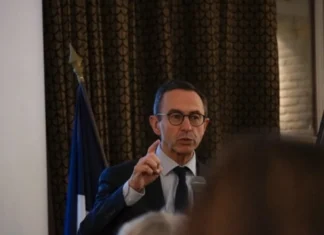The European Union has implemented a new package of sanctions—the 19th of its kind—aimed at prohibiting the organization and promotion of travel to Russia, both for individual and group trips. This decision is a response to a significant decline in tourism within Russia. In 2022, the country welcomed only 200,100 foreign tourists, a stark contrast to over five million in 2019. Travel agencies are now required to adhere to these restrictions, and noncompliance could lead to hefty fines, reaching up to one million lev in Bulgaria, or even imprisonment in certain cases.
Despite this drastic drop in demand for tourism to Russia, some travelers are still seeking information about potential trips. However, agencies are no longer providing services related to these inquiries. Instead, they are redirecting their clients to alternative destinations, such as Georgia and Kyrgyzstan, where interest and demand have surged. Tourism guides within Russia have noted a significant reduction in international tourists, and French travel agencies have ceased collaborations with Russian counterparts due to various logistical challenges.
The sanctions reflect broader geopolitical tensions and aim to limit Russia’s economic interactions following its actions on the international stage. The decline in tourism not only impacts the economy but also affects local businesses reliant on foreign visitors. The tourism industry’s collapse in Russia serves as a stark illustration of the far-reaching consequences of political decisions and international relations.
Travel agencies that previously operated trips to Russia are now actively searching for viable alternatives. For example, Georgia, which shares a border with Russia, has become a popular choice due to its rich culture, historical sites, and natural beauty. Similarly, Kyrgyzstan, known for its stunning landscapes and outdoor activities, is also experiencing an uptick in interest from travelers seeking new experiences. The shift in focus from Russia to these neighboring countries highlights a trend of adaptability within the travel industry.
Tour operators are striving to ensure that their clients still enjoy quality travel experiences without compromising on safety or legality. As part of this redirection, emphasis is being placed on destinations that offer unique cultural experiences and are accommodating to international tourists. This pivot also encourages a broader exploration of less-known regions that might not have previously drawn as much international interest.
While the overarching sanctions aim to isolate Russia economically, the consequences for the tourism sector create opportunities for other nations to showcase their attractions. Destinations such as Georgia and Kyrgyzstan stand to benefit from this scenario, possibly enhancing their travel infrastructure and services to accommodate the influx of visitors previously bound for Russia.
In conclusion, the EU’s latest sanctions and the subsequent downturn in Russian tourism catalyze a transformation in travel dynamics in the region. As agencies adapt by promoting alternative locations, the tourism landscape is evolving. With a focus on compliance and safety, travelers are encouraged to explore new destinations that offer vibrant cultures and enriching experiences—creating a ripple effect that could reshape the travel industry’s future in Eurasia. The long-term impacts of these sanctions are yet to be fully realized, but they undoubtedly signal a shift in the global tourism narrative.






